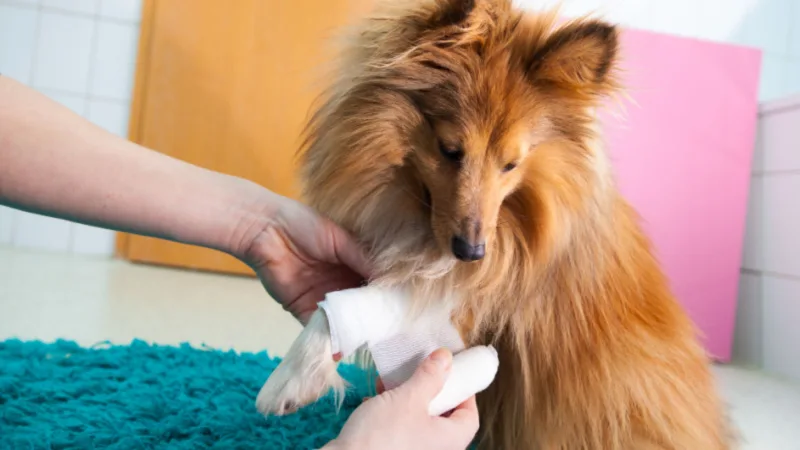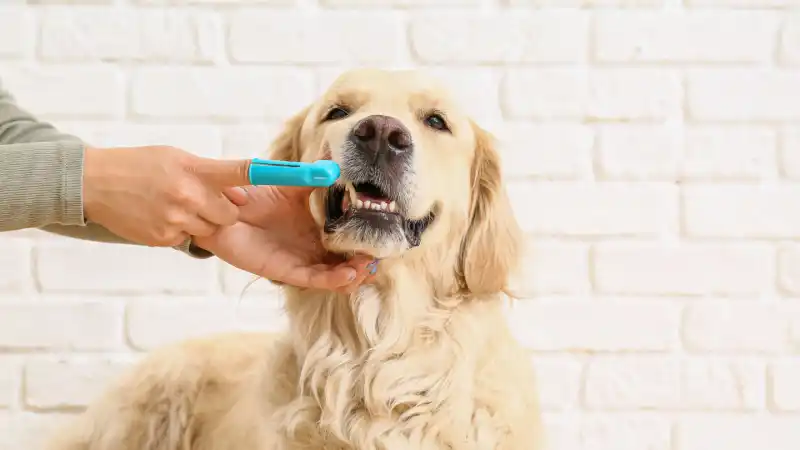What to Include in a Dog First Aid Kit
Being prepared on the go is the best way to keep your dog safe outside of the house. Here are 10 must-have items for your summer pet first-aid kit.

From scenic hikes to long days at the dog park, summer is full of so many fun outdoor activities for you and your pup. But with these outdoor activities comes the possibility of accidents and injuries.
To be prepared on the go, you should always have a first aid kit with you – whether in your car or your bag. These are the top 10 things you should include in a first aid kit for your dog this summer:
1. Antihistamine Medication
Just like with humans, antihistamine medication can help dogs manage allergy symptoms. It can be handy if your dog shows signs of a reaction to environmental allergens, like pollen. But it's also helpful if your dog is bitten by a bug or stung by a bee.
An antihistamine will help prevent an allergic reaction to the bite or sting, as well as reduce any itchiness that occurs. You can give your dog over-the-counter antihistamines like Benadryl but always consult with your veterinarian first so you know the right dosage to give your dog based on their weight.
2. Antibiotic Ointment
Having some kind of antibiotic ointment or spray is essential for keeping your pup safe during outdoor activities.
Whether your dog gets a small scrape on their paw, a rash from an allergic reaction, or simply has dry skin, an antibiotic ointment will help protect the wound from bacteria and germs so it can heal and hydrate.
3. Tweezers, Gauze, Scissors, and Tape
These tools are multipurpose, and you never know when one of them will be needed. Tweezers, for example, can help remove thorns or splinters from your dog's skin.
Gauze is also helpful if you or your dog are injured. It can be used to create a makeshift bandage or to clean a wound. Scissors can be used to cut gauze, tape, or anything else you might need in an emergency.
4. Baking Soda
If your dog is stung by an insect, the first thing you'll need to do is remove the stinger. Once that's done, make a paste of baking soda and water, which can be applied directly to the wound to help soothe the sting site.
Baking soda is also a great odor remover to have on hand if your dog has an unfortunate encounter with a skunk while you're out and about.
5. Tick Removal Tool
Ticks are most active during warm weather, specifically the spring and summer seasons. They’re known to carry a variety of diseases that can be dangerous to both humans and dogs, specifically Lyme Disease, Canine Ehrlichiosis, and Rocky Mountain Spotted Fever.
Always check your dog thoroughly for ticks before coming back inside. If you find one, in a pinch, you can remove them with tweezers, but ticks are notoriously stubborn insects. Having a specially-designed tick removal tool can make the process much easier and less stressful for you and your pup.
6. Saline Solution
Saline is a handy, multipurpose solution. If your dog gets an irritant in their eye while you're out, it can be used to safely flush the eye, remove the irritant, and prevent a potential infection.
Since it's sterile, saline solution can also be used to clean wounds before applying an antibiotic ointment or wrap. So, make sure to pack a small bottle in your dog's first aid kit.
7. Collapsible Water Bowl and Bottle of Water
Having plenty of water and a vessel for your dog to drink from is vital in any situation. But it's especially important if you're out in the heat, as dogs can easily overheat and become dehydrated.
A collapsible water bowl is easy to carry and can be filled up as needed. Make sure to also pack an extra bottle of water in case you need it to clean a wound or cool down your pup on a hot day.
8. A Muzzle
Your dog's behavior can be unpredictable in an accident. And if they're injured or hurt, they may try to bite out of fear and pain.
Having a muzzle in your first aid kit will help keep you and your pup safe if you need to clean or treat any kind of wound. You can also keep an Elizabethan collar in your first aid kit for an added layer of safety and to prevent your dog from licking at their wound.
9. A Flashlight
Flashlights are great for many emergencies, both for you and your dog. If you're out after dark and your dog needs medical attention, a streetlight is typically not bright enough for you to see what you're doing.
Flashlights can be used to help find ticks, stingers, or wounds that may be small and hard to see. This is especially true if your dog has dark-colored fur. In addition, flashlights are helpful for scaring off wildlife like coyotes or checking your surroundings to make sure you and your dog stay safe.
10. Emergency Paperwork
In every first aid kit, you should keep a copy of your dog's vaccination and medical records, as well as the phone numbers of your vet and any local emergency vets.
While you're likely carrying those numbers around in the contacts app of your phone, you could easily lose your phone in an emergency. If you need to make a call from a different phone, having those numbers handy can save you time – which can be critical in an emergency.
An emergency vet is also likely to ask about your dog's medical history, and in stressful situations, it's easy to forget important details. Having a copy of this information helps make sure your vet has all the info they need to help your dog.
Are You Prepared for a Summer Emergency with Your Dog?
Getting outside with your dog for an adventure can be fun, but you should always make sure you're prepared before you leave. With a well-stocked first aid kit, you can help keep you and your pup safe if an emergency does arise.
Take some of the stress out of unexpected emergencies with Accident & Illness Coverage from AKC Pet Insurance (underwritten by Independence American Insurance Company). Our dog pet insurance plans are designed to be there when you need them, allowing you to focus more on the health of your pet and less on costly veterinary bills. Click here for a quote today!

Richard has shared his life with pets since childhood, and currently has a rescue cat and dog. He works with veterinarians and pet businesses to improve their content. To find out more, please visit his [website](https://richardrowlands.com/).
READ MORE ARTICLES

